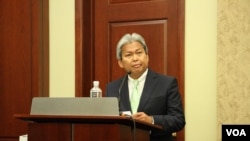When U.S. President Donald Trump announced the United States was pulling out of the mooted Trans-Pacific Partnership trade agreement, experts raised concerns over the impact on the Association of Southeast Asian Nations (ASEAN).
Speaking at an event celebrating the 50th anniversary of the founding of ASEAN, Patricia Mahoney, acting deputy assistant secretary for Southeast Asia of the Department of State, said the Trump administration remained committed to the region.
“It’s crucial for the world to hear, and it’s clear to us at the department of state and the administration that ASEAN matters. It matters to security, matters to peace, [and] matters to the prosperity in the region,” she said.
The event, held at the Capitol Hill Visitor’s Center in Washington, DC, on May 16, was organized by the East-West Center, US-ASEAN Business Council, and ISEAS YUSOF ISHAK Institute, which recently published an updated report called ASEAN Matters for America/America Matters for ASEAN.
The U.S., which has maintained diplomatic and trade relations with ASEAN since 1977, exports more than $100 billion in goods and services from the region.
Alex Feldman, president of US-ASEAN Business Council told VOA Khmer that Trump’s “America First” policy should not concern ASEAN states. “There is a lot of rhetoric, even by the Americans, but the thing is it is not a law. So, until it is a law, then let’s not overreact,” he said.
Budi Bowoleksono, Indonesian ambassador to the United States, said America is a global player, and that it cannot isolate itself from other countries, especially from Southeast Asia, with its growing economy worth more than $5.3 trillion annually.
“I believe that America First, other countries will say the same thing. But again we are not living isolated in the world. We need other countries to work with,” he said.
ASEAN’s economy has become the fifth-largest global market in recent years, and it is expected to become the fourth-largest market in the near future. Each year, U.S. exports to the region create more than 250.000 jobs in some states in the U.S., according to the report.
“Our economic relation with ASEAN is particularly important as well. U.S exports to ASEAN supports more than 560,000 American jobs, including 77,000 jobs in my home state, Texas,” said Representative Joaquin Castro (D, TX).
Partick A. Chausoto, chargé d'affaires of the Embassy of the Republic of the Philippines in the U.S., told VOA Khmer that “ASEAN matters to the U.S. and the U.S. matters to ASEAN because of the economic, political, and social ties.”
“The fact that we already have a strategic partnership means that we are rising up to a higher level,” he added.
With more than 625 million people, “the U.S. cannot ignore” the region, says Ambassador Bowoleksono. “Now more and more ASEAN companies [are] coming to the U.S., creating more jobs.”
The U.S. government needs a stronger alliance with ASEAN amid Chinese maneuvering in the South China Sea and rising tensions on the Korean peninsula, according to one U.S. security expert.
Responding to a question on the role of ASEAN in regional security matters, Lieutenant General Wallace C. Gregson Jr. said “we have to carefully consult with our allies to determine what actions may be necessary.”
Importantly, ASEAN’s alliances with South Korea and Japan would be a key tool to limit North Korea’s nuclear “capacity,” he said.
The presence of the U.S. military in the South China Sea remains critical to help countries combat “illegal activities in their own sea,” General Gregson said. “This might be an aggressive diplomatic effort to create a system to manage marine resources, not merely fish.”
President Trump is expected to begin his first trip to Southeast Asian countries in November where he will attend the East Asia Summit in the Philippines and Asia-Pacific Economic Cooperation meeting in Vietnam.









